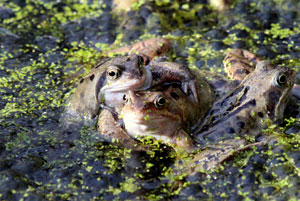Science: Unlocking potential
News and chat from the frontline of science and technology at PACA
I’m thinking of introducing some frogs into the school pond. Here is a picture of some happy ones at the University of Sussex (photograph courtesy of Paolo – my hubbie). For a fleeting moment I thought maybe we could carry out an experiment to show how Michael Faraday explained electric current via a frog battery but then I realised that I couldn’t bring myself to do it. I’ll stick to the potato clock! Of course prior to Faraday, also experimenting on frog legs were Luigi Galvani and Alessandro Volta.

Faraday (1791 – 1867) was born into a poor family yet his scientific achievements were so great that Albert Einstein kept a picture of him in his office, along with two other pictures – that of Isaac Newton and James Clerk Maxwell. Maxwell said of Faraday: “Faraday is, and must always remain, the father of the science of electromagnetism”.
Faraday was born into an era when only those from privileged backgrounds could afford to study science. Through a stroke of good luck though he gained a job as an apprentice bookbinder and his two favourite books were: The Encyclopedia Britannica – his source for electrical knowledge; and Conversations on Chemistry by Jane Marcet – his source for chemistry knowledge. Faraday was a man who used experimentations to make scientific discoveries and he was famous for never giving up on ideas, which came from his scientific intuition. Faraday said:“Nature is our kindest friend and best critic in experimental science if we only allow her intimations to fall unbiased on our minds.”
It would be great if we could re-align education with nature and get pupils to spend more time out of the classroom discovering science. I found it particularly alarming the other day to read that the UK’s Chief Medical Officer was ‘ashamed’ to report that rickets has made a comeback. Rickets is related to a vitamin D deficiency and children not spending enough time outdoors. Readers, take note!





















